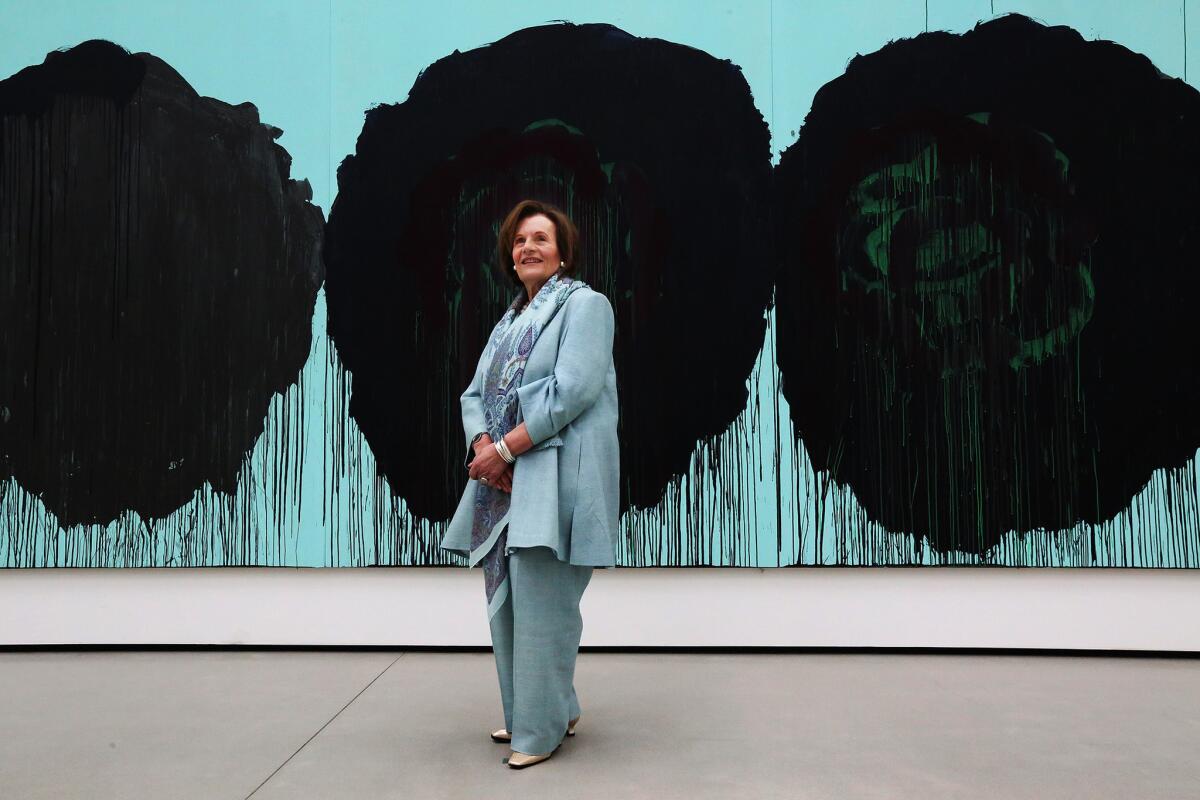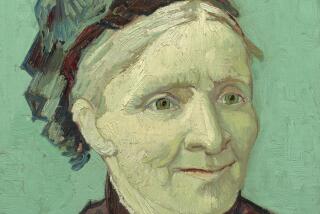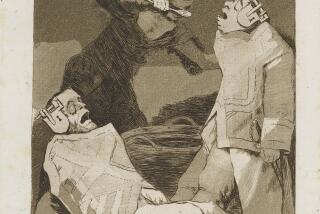How Edye Broad’s ‘natural eye’ drew her billionaire husband into the art world

Edye Broad at the Broad museum with a Cy Twombly painting titled “The Rose (V), 2008,” part of her and her husband Eli’s collection.
The nude in the silver frame calls no attention to herself amid the colors and splashes of Lichtenstein, Rauschenberg and other 20th century masters hanging in a well-lighted house beyond the pepper trees. But the Matisse drawing, an elegant work of quiet power, is one of Edye Broad’s favorites.
She and her husband, Eli, a billionaire accustomed to getting his way, disagree over the picture’s fate. “He wants to get rid of it, but I won’t let him,” said Edye. “It doesn’t fit in our collection. He’s so precise. One day, it will be gone.” She smiled with gentle defiance, closing the door and walking past a Warhol “Superman” on her way to reflecting pools that glimmered off the courtyard of their Brentwood estate.
Edye Broad is the aesthetic spirit of a couple that over the decades has amassed a collection of about 2,000 pieces of art valued at more than $2 billion.
The Broad museum, which opens downtown next month, is in many ways a testament to Edye, who bought her first picture, a postcard reproduction of Picasso’s “Three Musicians,” on a school field trip when she was 12. Since then, the couple have acquired the most celebrated names of postwar and contemporary art.
SIGN UP for the free Essential Arts & Culture newsletter >>
The $140-million museum, on Grand Avenue near Walt Disney Concert Hall, is a significant addition to the Southern California art scene, and the latest move by Eli Broad to make his mark on Los Angeles’ cultural landscape.
The Broads themselves are a portrait sketched over 60 years of marriage: he the logical, get-it-done businessman; she the well-read, unpretentious patron. They have befriended artists and visited studios and garrets around the world. Edye can tell you about the aloofness of Andy Warhol; the kindness of Roy Lichtenstein, whom she met in the 1970s in New York’s meatpacking district; the playfulness of Jeff Koons; and how Eli kept a Van Gogh pen-and-ink drawing in his underwear drawer to protect it from the light.
Their collaboration, notably in the early years, was marked by Edye’s eclectic inclinations and Eli’s desire to shape one of the world’s leading collections of contemporary art. He could appear passionate, if brusque, sweeping into a gallery, making assessments and departing. Edye was a slower touch, lingering, studying the work, chatting with the artist. She is, as those who know them say, the antidote to his sting.
“Edye responds to stuff emotionally, not intellectually. It’s her visceral reaction to a work of art,” said Stephanie Barron, senior curator at the Los Angeles County Museum of Art, where the Broads endowed a $56-million building designed by Renzo Piano. “She’s a humanist. She loves music, the opera. She’s a voracious reader and interested in a lot of the arts. She’s patient, not a word I’d use to describe Eli.”
Edye has a “maternal aspect with the world around her,” said Koons. “She knows the names of all my eight children.”
Koons recalled a time when he was watching President George W. Bush’s State of the Union address in the Broads’ home. “Edye walked into the room, looked at the TV and said, ‘Oh, that looks like a Gursky.’ It was just dead-on.” She was referring to Andreas Gursky, whose large photographs of scenes and images appear as if compressed constellations.
Unlike her husband, Edye, 79, prefers to stay out of the spotlight. “I don’t know why you’re writing about me,” she said. “I’m not very interesting.” She has a direct, Midwestern voice, a sly laugh and a wit, quick and dry. “I was very excited when Eli became interested [in art],” she once told a crowd at the Los Angeles Public Library. “Because the acquisition budget went up.”
‘Weak in the knees’
The daughter of a homemaker and a chemist whose company sold extracts, syrups and liqueurs in Detroit, Edye, born Edythe Lawson, was a child of World War II, paging through Life magazines and imagining the splendor of Rome and Athens.
“My father worked all the time,” she said. “We didn’t travel in my family.” She attended public school and went on class outings to the Detroit Institute of Arts. It was there she encountered “Watson and the Shark” by John Singleton Copley.
The 18th century painting of sailors in a rowboat trying to rescue a man was as unsettling as it was stirring. “That,” she said, “stuck in my mind.”
Edye dresses in bright blouses and has the air of a woman one might encounter at a small-town beauty salon, keen to the secrets of the neighborhood but too polite to repeat them. An Alexander Calder mobile and a Joan Miro painting decorate her home office, where she spends hours reading in a chair by the window, not far from a TV clicker (she is fond of “Mad Men” and Charlie Rose) and a Picasso portrait of one of his muses, Dora Maar.
“She gave him a lot of angst,” said Edye. She studied the painting, as if looking for a trace of past lives in the brush strokes. She had a similar reaction days earlier when meandering through the new museum, past the clatter of workers and boxes of unpacked art, and stopping before a canvas by Cy Twombly. “I love the color of these roses,” she said. “I just want to walk into it. It’s as if something good is waiting behind it.”
Edye and Eli were married in 1954 in Detroit. He had received her phone number from a friend; he took her on a few dates and, true to character, decisively proposed. Not long after, Edye’s father, Morris, gave Eli $12,500 as start-up capital for Kaufman & Broad home builders (now KB Home), which became successful building tract homes in the 1960s. Broad made a second fortune when he bought an insurance company that he turned into SunAmerica, a retirement investment company that was sold to AIG in 1999 for $18 billion.
The couple and their young sons, Jeffrey and Gary, moved to Los Angeles in 1963. Edye went on nighttime art walks through galleries on La Cienega Boulevard. She soon began buying, mostly Southern California artists, but one day she came home with a Toulouse-Lautrec poster.
Eli took notice. “Do you know what you’re doing?” Edye quoted her husband as saying. “This is a name I recognize.”
Edye’s inclinations intensified when the couple visited Taft Schreiber, a Republican operative and executive at MCA Inc., who would later introduce the Broads to dealers in New York. Schreiber’s home was decorated with works by Picasso, Matisse, Jackson Pollock and others.
“I was mesmerized,” she said. “I went weak in the knees. Oh, my goodness, to see these things not in a museum, but all in one house.”
The couple’s first major purchase was $95,000 for a Van Gogh drawing in 1972. But collecting significant works of established masters was difficult. Artists such as Van Gogh were either too expensive or owned by private collectors and museums.
As Eli, 82, became more involved, the couple concentrated on postwar and contemporary art, which for years they have lent to museums. The Broads, who still travel to art fairs in Basel, Switzerland, and other international cities in search of art, used the Van Gogh drawing as part of a trade for a painting by Robert Rauschenberg, whose works opened the way for Pop art.
“The things the artists were doing in the current time were interesting,” said Edye. “You could know the artist. You could buy work early. It wasn’t so expensive, and it was a fun experience. Some artists we bought young, and they went on to become successful. But it isn’t that we had this amazing eye that could walk in and say, ‘Ahh, that’s the next Picasso.’ ”
As if walls are scrapbooks, Edye can look at a piece of art and remember a time, a place. She nodded toward Warhol’s “Elvis.” “That’s when the price of art really started going up,” she said. “Eli met Warhol once at a party. Eli told him about our collection, and Warhol walked away.” She had earlier recalled an auction where a Warhol “Campbell’s Soup” came up for bid: “It kept going up and up, and I turned to Eli and I said, ‘What idiot would pay that much for that?’ And he had bought it.” (The Broads would not disclose the price, but it was reported to be $11.7 million.)
Eli credits his wife for a collection of pre-Columbian gold jewelry and the couple’s support of classical music organizations, the Broad Stage and the Edye, a small performance venue in Santa Monica. Edye’s love of opera — she is close to Placido Domingo, LA Opera’s general director — has made the Broads among the institution’s largest donors.
“Edye likes all different types of art,” he said. “I’m more disciplined than she is.”
Edye was involved in selecting the new museum’s architect, Elizabeth Diller of New York-based Diller Scofidio + Renfro. Eli added that Edye “has veto power over anything that goes into” their homes in Brentwood and Malibu and their apartment in New York.
Back in the 1970s, when Edye was still new to collecting, she popped into Lichtenstein’s New York studio, mentioning how much she admired his “Brushstroke Chair” and “Ottoman” sculptures. He mailed one of each to her shortly afterward.
“It was,” she said, “my most overwhelming art experience.” The other day, she stopped in front of the chair, which stands alone at the end of a long hallway in the window light of her home. Her voice quavered. “He was such a sweet man, “ she said of Lichtenstein, who died in 1997. “I miss him.”
Lichtenstein’s widow, Dorothy, said when she met Edye they had both taken up yoga. “If there’s any kind of narrative that goes with yoga, it’s having an open mind,” said Dorothy, president of the Roy Lichtenstein Foundation. “That may have been what broadened her tastes. What really endeared me to her was that the first time she did yoga, she fell. She was really embarrassed, but she went back. She’s able to laugh at herself.”
Edye has a particular affinity for Koons, a popular, if polarizing, artist whose works include a shiny porcelain sculpture of Michael Jackson and his chimp, Bubbles. “I love what Jeff does. I know it looks whimsical, but it isn’t to me,” she said. “There’s no limit.”
Shelley De Angelus, who curated the Broads’ collection for 15 years, said that Edye “has a natural eye.” “It’s not educated, but she will naturally go to the best thing in the room,” she said. “Edye was the best part of my job.”
She recalled a trip years ago. “It was July in Manhattan,” said De Angelus. “The artist’s studio was above a sausage factory. The stench was unbelievable. We were sweating. The stairs were rickety going to the third floor. Edye turned around and said, ‘And people think all you have to do is write a check to buy art.’ ”
The storyteller
Eli and Edye sat the other day on a couch in their living room beneath an undulating ceiling that swooped over large windows. The Cy Twombly painting that had been on the wall was moved to the museum, and Edye was getting accustomed to “Let a Thousand Flowers Bloom,” a huge canvas by Anselm Kiefer.
Microphones were placed before the couple for a recording of audio tracks for the museum’s guided tour. Dressed in a gray suit, pants pressed and cuffed, shoes agleam, a shirt white as a dove’s wing, Eli read from his script. A cadence quick and simple. Done.
Edye’s turn. She looked at the page, grimaced. She read, but it sounded stiff. “I can’t do it,” she said. Eli, fingertips pressed together, a foot tapping, sat next to his wife as if a bird awaiting flight. He smiled. Someone suggested that she not read the script but describe it as if in a conversation. Her voice softened, the words flowed.
She told stories.
It was over. Eli disappeared into his office. Edye stood in the foyer light. Gardeners were busy out by the pepper trees; the morning clouds were lifting over the hills. Edye turned to a visitor. “I still don’t know why you’re writing about me, but OK.”
She held a book (tales of the Filipino diaspora) and checked the time.
“C’mon,” she said, “I’ll show you around.”
She led the way, down hallways and through doors, stopping for a moment in front of the nude in the silver frame.
MORE:
Broad museum to show more than 250 works in inaugural display
Filling L.A.’s new Broad museum is an art in itself
Broad museum’s storage ‘vault’ to offer unique peek beyond the exhibits
An in-progress look at the Broad museum
New Broad museum restaurant will be more than a museum restaurant
More to Read
The biggest entertainment stories
Get our big stories about Hollywood, film, television, music, arts, culture and more right in your inbox as soon as they publish.
You may occasionally receive promotional content from the Los Angeles Times.











